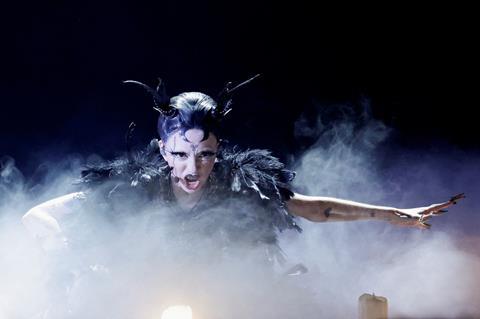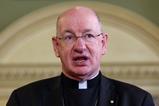‘Doomsday Blue’ was another example of a liberal backlash against the institutional church. That’s fair enough, says Tony Wilson. But the demonic imagery was a dangerous step too far, he says

This is an article I don’t particularly want to write. But I think I should. The outline was forming in my mind as I watched the Eurovision Song Contest on Saturday night.
My reticence springs from knowing full well that Bambie Thug’s Eurovision song, ‘Doomsday Blue’, is poking a big stick at people who hold socially traditional views. I don’t want to be that columnist who takes offence and harrumphs about things. I respect freedom of expression and understand that artists sometimes challenge and disturb us. But when the message includes occult references, curses and imagery so malevolent surely there is a right to reply.
Eurovision had a reputation for being harmless, cheesy fun for all the family. ABBA this is not. The entry from Ireland was dark to the extreme.
Anyone who has witnessed demonic forces will need no convincing that this is harmful
Being fair, we should judge the performance by the artists’ intentions. The lyrics are supposed to be about confronting self-doubt and never letting someone make you feel less than you are. Both of these are commendable ideas to explore. But quite how the lyrics support this theme is beyond me: “Avada Kadavra, I speak to destroy / The feelings I have I cannot avoid / Through twisted tongues a hex deployed on you / That all the pretties in your bed escape your hands and make you sad / And all the things you wish you had, you lose”
If someone has made me feel less than I am, can I undo this by cursing them? Does that make it all better?
Anyone who has witnessed demonic forces destroying the lives of individuals will need no convincing that this is harmful and dangerous. We should all be concerned when the occult is normalised.
Backlash
The subtext of this, and indeed much of the Eurovision content, is that this is payback time to redress the treatment of individuals who suffered repression by traditional societies. It is now considered an offence against humanity to get in the way from anyone expressing themselves in whichever way they see fit.
Christians need to acknowledge that this movement has been spurred on by the serious past failings of Christendom when it was in the ascendancy. Ireland, being the home of Bambie Thug, has a case to answer. When the Christian faith holds the balance of power the results are often ugly. The Church has been guilty of abuse and repression. We are witnessing something of a backlash to this.
A fault line is now emerging between ultra-liberals seeking freedoms that risk unpicking the fabric of society and the authoritarians who oppose them. I want to distance myself from both groups.
President Putin tells the Russian people that he is protecting them from liberal Europe busily destroying itself in acts of self-harm. He might even have a point. But, you can’t legislate people into social or religious conformity. The Old Testament demonstrates that the law is powerless to make people good. Paul tells us that the Law can only show us that we need saving from our own self-destructive tendencies (Romans 8:3). The law sheds light on where we have strayed but only love can change our hearts.
Meanwhile, far-right political groups pick up Putin’s story and they tell us that England is a “Christian country” and we need to turn the clock back to a golden age. They add to this a mix of racist policies that no sincere Christian could possibly entertain.
As Eurovision offers a future of unbridled self-expression, traditionalists are being driven further to the right and the centre-ground is disappearing.
Surely Christians can find new ways of communicating that some forms of self-expression, even those that do not immediately harm others, are damaging to the individual themselves. The paradox of Christianity is that finding our true identity only comes by losing ourselves in Christ (Matthew 10:39). Sociological evidence is mounting that giving people more and more choice about how to define themselves is leading to ever increasing levels of depression and anxiety.
I don’t want to be the self-righteous prig who calls people to fall in line. I’m not that person. I know only too well that I also need saving from the mess I so often make. But I want to say that Eurovision is not a formula for human flourishing. Let’s do our best to shine a light where there is currently only darkness.






































5 Readers' comments